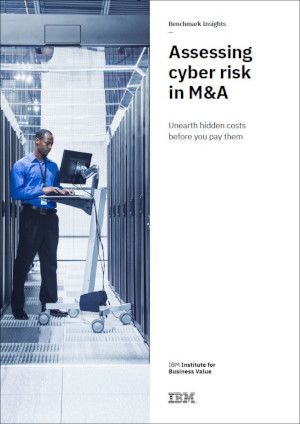Ungated Post | 19 Feb 2021
Assessing cyber risk in M&A: Unearth hidden costs before you pay them

To better understand strategies behind M&A success, we worked with IBM’s Institute for Business Value (IBV) to survey leaders from 720 organizations across the electronics, chemicals and petroleum, and healthcare and life sciences industries.
Respondents spanned 18 countries. Each respondent holds overall responsibility for the M&A process, from the definition of M&A strategy to post-purchase integration.
In mergers and acquisitions (M&A), value realization is typically top of mind. But cyber-risk is real. Considering data privacy regulations and mandatory breach disclosure laws, cyber risk exposure has the potential to significantly impact post-merger valuations. When assessing the value of a potential acquisition, acquiring organizations must factor in the cost of cyber risk as part of their deal strategy.
Our Thought Leadership team produces original, evidence-based research made accessible to decision-makers and opinion leaders. Principals for this project included:
Oxford Economics’ team is expert at applying advanced economic tools that provide valuable insights into today’s most pressing business, financial, and policy issues.
Related Services

Post
The economic impact of abandoning the WTO
Oxford Economics have been commissioned by the International Chamber of Commerce (ICC) to provide an independent assessment of the economic impact of WTO dissolution. This report details our findings and the assumptions underpinning our analysis.
Find Out More
Post
The economic impact of the sports activities of public service media
This study shows how the sports activities of public service media supported €4.5 billion of GDP and 57,000 jobs across 31 European countries in 2022. The report also highlights wider economic benefits of public service media sports coverage, such as the way in which it leverages sponsorship income for sports bodies.
Find Out More
Post
Global Trade Education: The role of private philanthropy
Global trade can amplify economic development and poverty alleviation. Capable leaders are required to put in place enabling conditions for trade, but currently these skills are underprovided in developing countries. For philanthropists, investing in trade leadership talent through graduate-level scholarships is an opportunity to make meaningful contributions that can multiply and sustain global economic development.
Find Out More